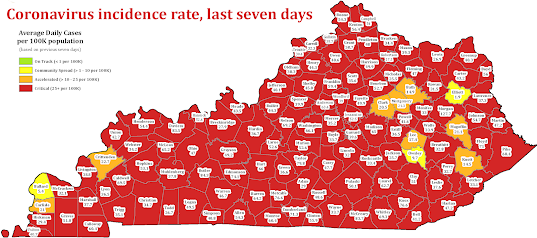Coronavirus metrics largely stable, but deaths still high; health commissioner warns Super Bowl gatherings can spread virus

State Dept. for Public Health map, relabeled by Kentucky Health News; click on it to enlarge.
—–
“I’m not going to tell you that two is not better than one, but one [mask] plus more than six feet of distance is probably still pretty good — and what we need everybody to do all the time,” he said.
“The single most important metric is how many people have been vaccinated, how many unique people have been vaccinated, because those are the persons who are on the road to protection from the vaccine,” Stack said, As a matter of “routine course,” he added, everyone who gets a first dose of the Pfizer Inc. or Moderna vaccine will get the second.
“So please know, they are vaccinating,” he said. “They’re using everything they’re getting as quickly as they can. It’s a matter of needing more vaccine to fulfill the demand right now, which is very large.”
In the state Senate, Sen. Robbie Mills, R-Henderson, spoke to the frustration of his senior constituents, saying there are “zero vaccines available” in a three-county area and there is a perception that Indiana is doing better than Kentucky in its vaccine rollout. Mills said he has talked to Transportation Secretary Jim Gray, the vaccine coordinator, and that knows “they are trying,” but it would be helpful if they knew more to be able to better inform their constituents.
Asked about the perception that other states are doing better, Beshear said Kentucky is a top 10 state for vaccinations, and is ahead of Indiana. He said many doses have been provided to Mills’s district, and vaccines have been distributed equitably across the state. He said there is simply not enough supply to vaccinated everyone who wants one: “We’re getting it out as fast as we can.”
- Today’s fatalities are an Adair County woman, 59; a Ballard County woman, 63; a Bell County woman, 85; a Boone County woman, 29; a Boone County man, 79; a Boyle County woman, 82; a Boyle County man, 93; a Breathitt County man, 93; two Calloway County men, both 72; two Campbell County men, 51 and 82; a Carter County woman, 87; a Casey County man, 60; a Fayette County woman, 75; two Fayette County men, 53 and 86; a Fleming County woman, 90; two Franklin County men, 68 and 94; two Gallatin County men, 53 and 62; two Hardin County women, 85 and 88; a Hardin County man, 81; a Hart County man, 89; two Hopkins County women, 69 and 86; two Jefferson County women, 80 and 81; three Jefferson County men, 80 96 and 100; a Kenton County woman, 79; a Laurel County woman, 77; a McCracken County woman, 54; two McCracken County men, 65 and 69; two Marshall County women, 63 and 77; two Meade County men, 71 and 80; a Mercer County woman, 64; a Montgomery County man, 53; a Nicholas County man, 75; an Ohio County woman, 90; a Trigg County man, 88; a Washington County man, 93; a Wayne County man, 88; a Whitley County woman, 87; and a Whitley County man, 89.
- Counties with 10 or more new cases were Jefferson, 424; Fayette, 152; Kenton, 134; Boone, 117; Daviess, 107; Campbell, 87; Warren, 85; Hardin, 69; Madison and Oldham, 57; Bullitt, 50; Christian and McCracken, 44; Grant and Marshall, 36; Laurel and Pulaski, 33; Barren, 32; Nelson, 31; Knox, 29; Logan, 27; Pike, 26; Boyd, 23; Henderson, 22; Scott and Taylor, 21; Floyd, Greenup, Hopkins, LaRue and Lincoln, 20; Clark, Graves and Shelby, 19; Meade, Menifee and Whitley, 18; Wayne, 17; Butler, Jessamine and Ohio, 16; Bourbon and Woodford, 15; Allen, Calloway, McCreary and Mercer, 14; Hart, Muhlenberg and Simpson, 13; Anderson, Edmonson, Franklin, Garrard and Johnson, 12; Boyle, Clay, Grayson, Perry and Rockcastle, 11; Henry, 10.
- J. Michael Brown, secretary of Beshear’s executive cabinet, said state prisons have 55 active staff cases and 270 active resident cases. He said these numbers have dropped in the last two weeks, when there were 169 active staff cases and 2,227 active inmate cases. He said seven of the state’s 14 correctional facilities are Covid-free. So far, he said, there have been 929 staff cases and 6,884 inmate cases, and 43 inmates and five staffers have died from Covid-19. Inmates have not yet been put on a priority list for the vaccine.
- In long-term care facilities, there are 431 active resident cases and 298 active staff cases, with 28 new residents and 15 new staff testing positive today.
-
Hospital numbers are “really stable,” Beshear said; 1,340 people are hospitalized with Covid-19 in Kentucky, 368 of them in intensive care and 171 of those on a ventilator.
-
Intensive-care beds in four hospital-readiness regions are more than 80% full: Barren River, 82.41%; northeast, 82.81%; east, 82.35%; and Lake Cumberland, 97.78%.
- The Lexington-Fayette County Health Department has vaccinated about 500 seniors, many of them part of hard-to-reach populations, in wheelchairs or without transportation, Jeremy Chisenhall reports for the Lexington Herald-Leader. Beshear has said independent pharmacies and health departments will likely play a huge role in reaching he hardest to reach populations.
- Dr. Sarah Moyer, Louisville’s chief health officer, recommends that most Louisville residents get tested for the virus weekly, especially if they are or have been going to work, traveling, shopping in grocery or retail stores, eating at restaurants or bars, going to in-person church, have children participating in sports, attend gatherings where people don’t wear masks, have been exposed to someone who has tested positive, or have symptoms of Covid-19 including fatigue, headache, runny nose, cough or loss of taste or smell, WDRB reports.
- Side Effects Public Media, published on WFPL, talks to two scientists about vaccines in an effort to help those who may be hesitant to get vaccinated.